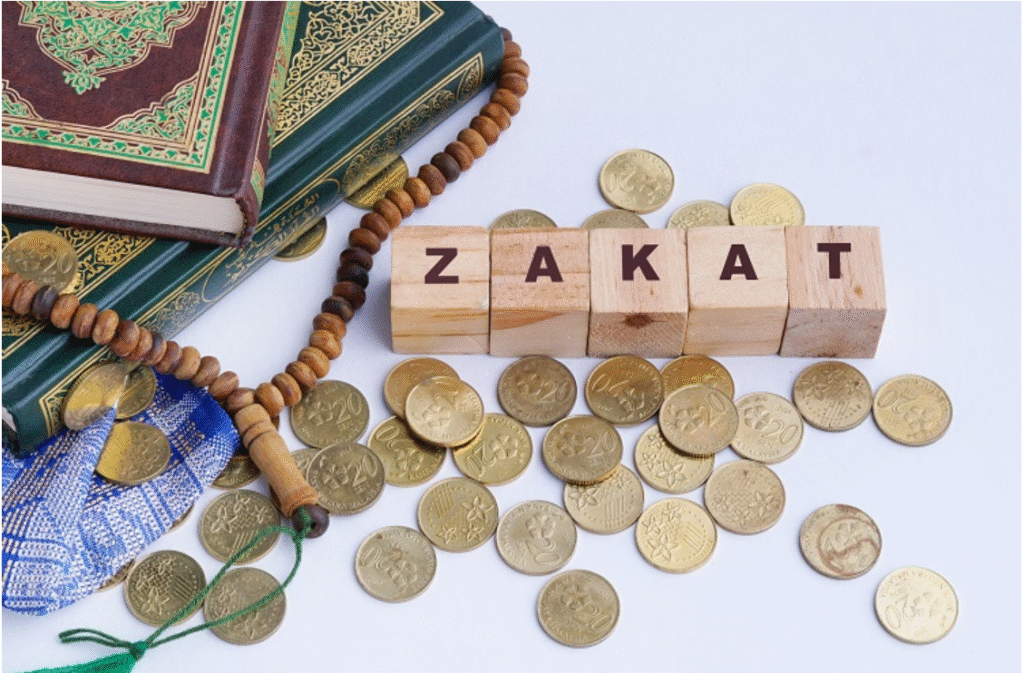
Zakat is one of the five pillars of Islam, a duty that every Muslim who is able must perform. It purifies our wealth, helps the poor, and strengthens the bonds of the Muslim community. Many people know that Zakat is due once a year, but often they are not sure how to calculate it—especially when it comes to gold and money.
Let’s go through it step by step in a simple and easy way, insha’Allah.
Why Do We Pay Zakat?
Zakat is not just a financial duty—it is an act of worship. Allah commands it in the Qur’an:
“And establish prayer and give zakah, and whatever good you put forward for yourselves – you will find it with Allah.” (Surah Al-Baqarah 2:110)
By giving Zakat, we are reminded that our wealth is a trust from Allah, and that sharing a small portion of it benefits both ourselves and those in need.
The Nisab: Minimum Amount Before Zakat Becomes Due
Before paying Zakat, you need to know if your wealth has reached the Nisab, the minimum amount that makes Zakat obligatory.
For gold: Nisab = 87.48 grams (about 7.5 tolas).
For silver: Nisab = 612.36 grams (about 52.5 tolas).
For money: It is compared to the value of either gold or silver.
Scholars often recommend using the silver Nisab since it allows more people to give Zakat and benefit the poor.
Zakat on Gold
If you own gold, here’s how to calculate Zakat:
Weigh your gold – Include jewelry, coins, or bars.
Check the Nisab – If it is above 87.48 grams, Zakat is due.
Find the current market price of gold per gram.
Calculate the total value = (weight of gold × price per gram).
Pay 2.5% of the total value as Zakat.
📌 Example:
Gold = 100 grams
Price per gram = $60
Total value = $6000
Zakat = $6000 × 2.5% = $150
Zakat on Money (Cash and Savings)
Zakat is also due on cash in hand, bank accounts, savings, investments, and business money.
Steps:
Add up all the money you own (cash + bank balance + investments).
Deduct any immediate debts or bills that are due.
If the remaining amount is equal to or above Nisab, pay 2.5%.
📌 Example:
Savings = $5000
Debts = $1000
Net savings = $4000
Zakat = $4000 × 2.5% = $100
Combining Gold and Money
If you have both gold and money, you combine them to check if you meet the Nisab.
📌 Example:
Gold value = $4000
Cash savings = $2000
Total wealth = $6000
Zakat = $6000 × 2.5% = $150
This way, you ensure that you don’t miss Zakat if each separately doesn’t reach Nisab but together they do.
When Do You Pay Zakat?
Zakat is due once a year.
You should mark a date in your calendar (for example, Ramadan 1st) and pay every year on that date.
This ensures you don’t forget and remain consistent.
Common Questions
Do I pay Zakat on gold I wear?
Yes, if it reaches the Nisab and you follow the opinion that jewelry is zakatable (which most scholars agree on).
What about silver?
The same rule applies: pay 2.5% if it reaches 612.36 grams.
Can I pay Zakat in installments?
Yes, but it is best to pay it all at once when it becomes due.
Can I give Zakat to relatives?
You may give to poor relatives, except your direct dependents (parents, children, spouse).
Conclusion
Calculating Zakat on gold and money may seem confusing at first, but it is actually simple: once your wealth reaches the Nisab, you pay 2.5% of its total value. Whether it is gold, cash, or savings, Zakat is a way to purify your wealth and help those in need.
Remember, Zakat is not a loss—it is a blessing. The Prophet ﷺ said:
“Wealth never decreases by giving in charity.” (Sahih Muslim)
So, by giving Zakat, you are actually increasing your blessings, in this world and the next.
Take the Next Step in Learning
If you want to learn more about Zakat, Salah, Qur’an, and all the basics of Islam in a clear and structured way, I recommend checking out Online Islamic Institute. They offer premium Islamic courses for all ages, helping you grow in faith and knowledge step by step.
Explore their courses here: https://onlineislamicinstitute.org/ – insha’Allah, it will bring you closer to understanding and practicing Islam with confidence.
JazakAllahu khair for reading. May Allah accept our Zakat, purify our wealth, and make us among those who give sincerely. Wa Assalamu Alaikum wa Rahmatullahi wa Barakatuh.